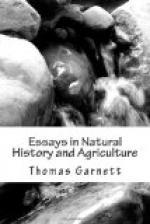GENTLEMEN,—I am somewhat at a loss to understand the object of Mr. Horsfall’s letter on this subject which appears in the “Mercury” of to-day. If he means that fish hatched by this process are as much at the mercy of their natural enemies as they are in their natural spawning beds I differ from him entirely; but if he means that there is no good in breeding migratory fish like Salmon, when the obstacles to their return in the shape of stake nets, impassable weirs, and poisonous waters are so numerous as they are at present in many rivers (the Wharfe and the Aire are examples of both), I entirely agree with him. Let us consider both suppositions, for the more this subject is ventilated the more likely is good to arise from the discussion. I think Mr. Horsfall is entirely wrong in the first supposition, for the following reasons: By artificial propagation the young fish escape all damage from floods, and particularly ice floods, which scoop out all the loose gravel from the spawning beds, which are frequently entirely carried away by these floods. They escape all danger from drought, which in some rivers is almost as bad, there being now several mounds of dry gravel in my length of the Ribble which were spawning grounds last December. They escape being destroyed as ova by Trout, Eels, Bullheads, Loaches, the larva of aquatic insects, ducks (wild and tame), water rats, and water shrews. The last are said to be destructive to the spawn; but this I do not vouch for, as these two last-mentioned animals have not come under my own observation as devourers of spawn.
With regard to the 500 Salmon ova said to have been taken from the stomach of a Trout, Ramsbottom is the authority for it, only he says there were nearer 1,000 than 500, and he took them from the maw of a large lake Trout at Oughterard, when netting the spawning Salmon for his artificial propagation. When Ramsbottom was fish breeding for Mr. Peel the year after he first went to Ireland for that purpose, he went into the brooks at night with a light. He never found a pair of spawning fish without also finding several waiters on Providence in the shape of small Trout, which were picking up the ova that descended the streams towards them. Several of these he caught, and they were perfectly gorged with spawn.
With regard to the ducks, Ramsbottom is again my authority. He found that a flock of tame ducks frequented the spawning beds at Oughterard; he bought one for the purpose of ascertaining whether they eat spawn or not, and he found its crop quite full of spawn. With regard to the aquatic larvae of insects, Mr. Horsfall may easily satisfy himself that they destroy spawn if he will turn some into an artificial spawning bed. One of my friends failed to hatch his Trout ova because he could not keep out the fresh-water shrimps.
Mr. Horsfall seems to think that nature would be sufficient to take care of her own interests if man did not step in to aid her endeavours; but if he is a sportsman he no doubt has a game-keeper, who not only preserves the ground from poachers, but traps cats and weasels, shoots hawks, magpies and carrion crows, breeds tame pheasants, and generally looks to the well being of the game without trusting to the efforts of unassisted nature.




